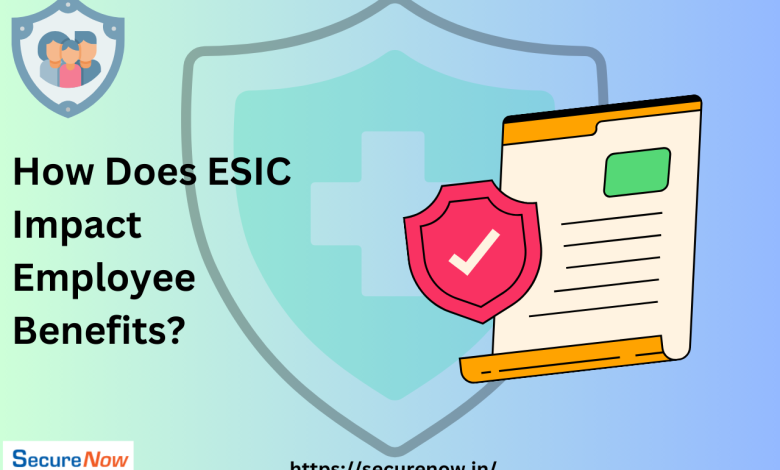How Does ESIC Impact Employee Benefits?

The Employees’ State Insurance Corporation (ESIC) is a statutory body under the Ministry of Labour and Employment in India, designed to provide comprehensive health and social security benefits to employees. ESIC plays a crucial role in supporting employees by covering medical, financial, and social aspects of their well-being. For employers, offering ESIC coverage is an opportunity to support their workforce and build a positive, supportive work environment.
In this article, we explore the significant impact of ESIC on employee benefits, highlighting how it improves healthcare access, financial stability, and workplace morale.
Understanding ESIC: An Overview
The Employees’ State Insurance Scheme (ESIS) operates under the ESIC and is mandatory for companies with 10 or more employees earning ₹21,000 or less per month. Through monthly contributions from both the employer and employee, ESIC provides a range of benefits to the insured. WC policy and ESIC contributions are calculated as a percentage of wages, with employers contributing 3.25% and employees contributing 0.75%.
What Are ESIC’s Core Benefits?
ESIC’s scope extends beyond just health insurance. It includes a comprehensive list of benefits, including medical care, sickness benefits, maternity benefits, disablement benefits, dependent benefits, and funeral expenses. These benefits are structured to provide employees with both preventive and curative healthcare support.
1. Improved Healthcare Access
Unlimited Medical Coverage
One of the most significant impacts of ESIC on employee benefits is the unlimited medical care provided to insured employees and their families. This coverage ensures that employees have access to medical facilities, hospitalization, and specialist care without the burden of additional costs. ESIC operates its own network of hospitals and dispensaries, providing a cost-effective solution for both employees and employers.
Preventive Health Services
ESIC prioritizes preventive healthcare by conducting regular health check-ups, vaccinations, and wellness programs. These services promote early diagnosis and prevention, ensuring employees maintain optimal health and reducing absenteeism.
Family Coverage
ESIC also covers an employee’s spouse, children, and dependents, ensuring that the employee’s family has access to comprehensive healthcare. This holistic coverage helps ease financial stress, especially in cases where family members require ongoing medical care or hospitalization.
2. Financial Security through Sickness and Disability Benefits
Sickness Benefit for Income Stability
ESIC provides a sickness benefit, offering financial support during periods of illness. Eligible employees receive up to 70% of their average daily wages for a maximum of 91 days in a year, allowing them to focus on recovery without income worries. This coverage is particularly helpful for employees in labor-intensive roles, where work-related injuries and illnesses are more common.
Extended Sickness Benefit for Long-Term Illnesses
In cases of long-term illnesses such as tuberculosis, cancer, and cardiovascular diseases, ESIC extends the sickness benefit for up to 2 years, at 80% of the employee’s average wages. This extended benefit provides invaluable support for employees facing prolonged treatments.
Disability Benefits for Permanent or Temporary Disability
For employees who suffer work-related injuries leading to disability, ESIC offers disablement benefits. This benefit provides financial compensation based on the severity of the disability:
- Temporary Disablement Benefit: Affected employees receive 90% of their average wages until recovery.
- Permanent Disablement Benefit: Compensation is provided as a monthly pension, adjusted according to the level of disability.
These disability benefits ensure that employees remain financially secure, even if they cannot return to work immediately or if their capacity to work is permanently affected.
3. Maternity Benefits and Financial Support for Women Employees
The maternity benefit under ESIC covers female employees for up to 26 weeks of maternity leave, with 100% of average daily wages paid. This benefit extends to situations like miscarriage or pregnancy-related illness, providing 6 additional weeks of support. ESIC ensures that women employees can focus on their health and newborn care without compromising their financial stability.
4. Dependent Benefits for Family Support
In cases where an insured employee passes away due to a work-related injury, ESIC extends a dependent benefit to the surviving family members. This benefit ensures that the family receives monthly financial support, which is calculated as a percentage of the deceased employee’s wage.
The dependent benefit plays an essential role in helping families transition and cope with the loss of the primary income earner. ESIC’s support to the family during this difficult period reflects its commitment to social security and care for workers.
5. Funeral Expenses and Immediate Relief for Families
In the unfortunate event of an employee’s death, ESIC provides funeral expenses up to ₹15,000. This lump-sum payment helps cover the immediate costs associated with the funeral, ensuring the family does not face an additional financial burden during a time of grief.
6. Vocational Rehabilitation and Skill Development
For employees who have suffered permanent disablement, ESIC offers vocational rehabilitation programs. These initiatives help disabled employees develop new skills, making it easier for them to re-enter the workforce. Such programs are crucial for boosting morale and providing employees with a sense of purpose and direction despite their physical limitations.
The Impact of ESIC on Employee Morale and Productivity
Boosting Employee Morale
With the wide-ranging benefits that ESIC offers, employees feel valued and cared for, which boosts their overall morale. Knowing that they and their families are covered in case of illness, injury, or death instills confidence and reduces stress levels, leading to improved productivity and workplace satisfaction.
Reducing Financial Stress
For employees, especially those from low-income backgrounds, ESIC’s financial assistance helps them focus on their work without worrying about unexpected medical expenses or loss of income. This financial security contributes to better mental health and overall well-being, leading to higher levels of employee engagement and retention.
Why ESIC Is an Essential Investment for Employers?
Employers benefit from ESIC’s positive impact on employee well-being, as it contributes to a healthier, more engaged workforce. A robust social security scheme like ESIC fosters a supportive work environment, enhances employee loyalty, and improves the company’s reputation as a caring employer.
Additionally, by contributing to ESIC, employers fulfill a legal obligation under the Employees’ State Insurance Act, ensuring compliance with national labor laws and safeguarding the rights of their workforce.
Conclusion
ESIC is a transformative social security program that extends crucial benefits to employees, ranging from medical coverage to financial support during times of illness, maternity, or disability. For both employees and employers, the ESIC scheme serves as a vital resource, enhancing the overall well-being of the workforce while promoting a stable and productive work environment.
By addressing healthcare, income stability, and family support, ESIC strengthens the employer-employee relationship and contributes to a more resilient and empowered workforce.





